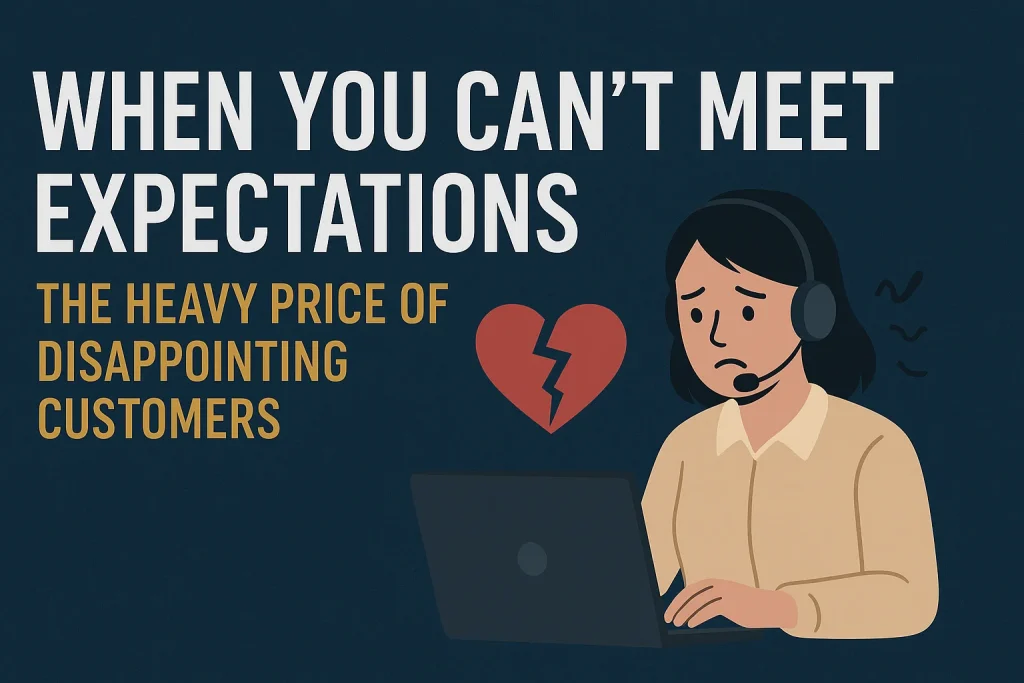
If you’ve ever watched a customer walk away without saying a word, you know the silent sting of failure. In business, managing customer expectations is more than being polite—it’s survival. Your ability to anticipate, prepare, and deliver determines whether customers stick around or disappear for good.
Customer service is not just about answering calls or responding to complaints—it’s about protecting your revenue and reputation. And when you fail to meet expectations, you’re not just losing loyalty—you’re losing money.
When the Organization is Struggling, Customers Feel It First
One of the first signs of trouble in any organization—whether financial, structural, or operational—is a dip in customer experience. Promises go unfulfilled. Delivery times stretch. Service quality drops.
I’ve seen this firsthand. In one workplace, budgets were tight, systems weren’t maintained, and complaints were on the rise. We—the front desk team—were the ones customers saw, so we took the heat daily. The root problem wasn’t us, but customers didn’t care. To them, we were the face of the business. And with every disappointed customer, the organization was bleeding trust—and revenue.
The SACCO Crisis That Changed My Perspective
The most unforgettable lesson in managing customer expectations in business came when I joined a SACCO. Oh, I was excited—finally, a professional environment where I could grow. But two weeks in, the cracks appeared.
Customers were coming in, demanding their savings. The SACCO could not lend, and worse, it didn’t have the money to return deposits. Management had taken huge loans—five or six years earlier—and never repaid them. The institution was deep in crisis.
I remember one customer vividly. He had been told excuse after excuse every time he visited. This time, he refused to leave. He was angry, desperate, and threatening to report the SACCO to authorities in Nairobi. There I was—powerless to fix the real issue, but standing in the line of fire.
When expectations aren’t met, customers don’t just lose faith—they lose patience. And sometimes, they explode.
The Grocery Shop Wake-Up Call
When I later ran my own grocery shop, I learned the same lesson from the other side. There were seasons I simply couldn’t meet demand. Sometimes I hadn’t saved enough to restock in time. Other times I failed to anticipate trends—like when school holidays meant more cereals, snacks, and fruits flying off the shelves.
Stockouts weren’t because I didn’t care. They happened because I wasn’t prepared. And preparation in business is everything.
Operating Cash: Your Lifeline
Without operating cash, you’re flying blind. You can’t restock quickly, respond to sudden demand spikes, or grab a supplier’s limited-time discount.
A healthy business keeps a cash reserve for emergencies and slow months. It’s your safety net. For tips on building and protecting this, check out Managing Business Finances and Money Management in Business.
Stock Management: The Art and Science of Never Running Out
Poor stock management is far from a minor issue. In 2023, global inventory distortion—a mix of out-of-stocks and overstocks—cost retailers $1.77 trillion, with stockouts alone responsible for $1.2 trillion in lost sales (Retail TouchPoints, Food Institute). Persistent stockouts also rack up nearly $1 trillion in losses every year (National Retail Federation), making accurate inventory control a top priority for long-term business success.
Modern stock management hinges on a few critical strategies:
- Accurately track what’s in stock, including condition, demand, and turnover.
- Streamline ordering, storing, and shipping with techniques like just-in-time delivery, first-in-first-out (FIFO), and proper forecasting.
- Use unified systems that connect online and in-store inventory—Shopify POS, for instance, automatically syncs transactions to prevent double-selling and keeps everything updated in real time Shopify.
- Apply analytical tools to decide when to replenish stock and how to balance between overstocking (which ties up cash) and running dry (which loses sales) Shopify.
When Staff Are Your “Stock”
For service-based businesses, your stock is your staff’s time and expertise. And woe unto you if you have a fully booked schedule, but your key staff member ghosts you on delivery day.
Scrambling for a last-minute replacement can mean delays, rushed work, or outright cancellations—all of which chip away at your credibility.
Backup planning is critical:
- Cross-train employees so they can step in when needed.
- Keep a network of freelancers or part-timers for emergencies.
- Always have a communication protocol for sudden absences.
The High Cost of Quiet Departures
Some customers will tell you when they’re unhappy. Many won’t. They’ll just vanish, taking their business—and their referrals—with them.
I learned this the hard way. Regular customers from my grocery shop stopped showing up, and I didn’t realize why until it was too late.
When you lose customers quietly, you also lose the chance to make things right.
Key Takeaways for Managing Customer Expectations in Business
- Customer Service Drives Revenue: Every satisfied customer is a potential repeat sale and a free marketing channel.
- Be Honest About Limitations: Customers prefer honesty over excuses.
- Plan for Stock & Cash Flow: Keep your shelves full and your reserves healthy.
- Have a Backup Plan: Staff or suppliers can fail—anticipate it.
- Monitor Customer Sentiment: Don’t wait for complaints—proactively check in.
Call to Action
If you’re serious about managing customer expectations in business, start now:
- Review your stock levels today.
- Build an operating cash buffer for at least one month’s expenses.
- Train or hire backup support before you need it.
📌 For more real-world business lessons, read Bumpy Road to Self-Employment.
💡 Want tools to help?
- Small Business Cash Flow Guide – Amazon
- POS System for Retail Inventory – Amazon
- Time Management for Service Providers – Amazon
Your customers are watching. Every promise kept builds trust; every promise broken takes years to repair. Don’t give them a reason to quietly leave.




